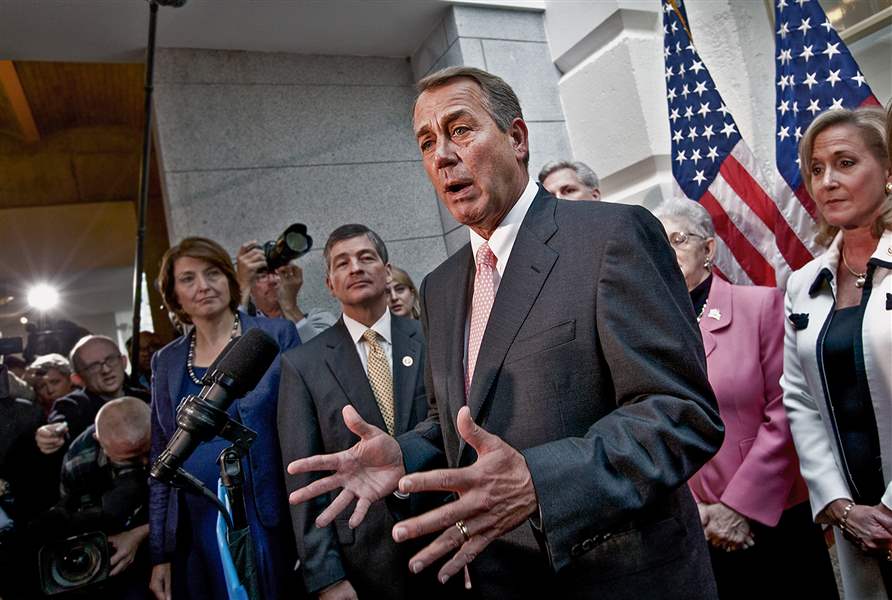
GOP’s short-term plan gets debt talks rolling
Details unresolved, but Wall Street roars approval
10/11/2013
House Speaker John Boehner of Ohio, shown with fellow Republicans at a news conference, later took part in talks trying to reach a deal with President Obama on the debt ceiling at the White House late Thursday.
ASSOCIATED PRESS

House Speaker John Boehner of Ohio, shown with fellow Republicans at a news conference, later took part in talks trying to reach a deal with President Obama on the debt ceiling at the White House late Thursday.
WASHINGTON — President Obama and congressional Republicans met Thursday in search of a compromise to avert an unprecedented U.S. default as early as next week and end the 10-day-old partial government shutdown.
“We expect further conversations tonight,” House Majority Leader Eric Cantor (R., Va.) said at nightfall after he, House Speaker John Boehner (R., Ohio), and other Republicans met with Mr. Obama at the White House. No deal emerged from the 90-minute discussion, but both sides were expected to continue talks.
“The President looks forward to making continued progress with members on both sides of the aisle,” the White House said.
It was the first sign of a thaw in a political crisis that has weighed on financial markets and knocked hundreds of thousands of federal employees out of work.
In response, the Dow Jones industrial average soared more than 300 points on Thursday, its biggest point rise this year.
The Dow jumped 323.09 points to close at 15,126.07 and end a three-week funk in stocks.
The Standard & Poor’s 500 index rose 36.16 points, or 2.2 percent, to 1,692.56, and the Nasdaq composite rose 82.97 points, or 2.3 percent, to 3,760.75.
Stocks had declined steadily since mid-September as the political gridlock got investors worried the government could default on its debt and wreak havoc on global financial markets.
While traders applauded a potential deal between the White House and Congress, more volatility could be ahead if it falls through.
“We don’t need some grand bargain. We just need to avoid a default,” said Brian Reynolds, chief market strategist at Rosenblatt Securities. “Just don’t bring us to the edge again.”
During a closed-door morning session in the Capitol, Mr. Boehner told fellow GOP lawmakers, the plan would leave the shutdown in place while raising the nation’s $16.7 trillion debt limit and set up negotiations between the GOP and the President over spending cuts and other issues.
White House spokesman Jay Carney said the President would “likely sign” a short-term extension in the debt ceiling and did not rule out his doing so even if it left the shutdown intact.
Senate Majority Leader Harry Reid (D., Nev.) wasn’t nearly as amenable. “Not going to happen,” he said.
That comment was made after the stock market closed.
White House officials were careful not to term the meeting a negotiation, after Mr. Obama spent weeks declaring he would not negotiate over lifting the debt ceiling.
According to a Democrat familiar with the meeting, Mr. Obama told the House speaker to come back with proposals for reopening the government but reiterated he would not make policy concessions.
By the time House Republicans had returned from the White House hours later, Rep. Hal Rogers (R., Ky.) said part of their hope was to “quickly settle” on legislation to permit the government to reopen.
Mr. Rogers, chairman of the House Appropriations Committee, said it was clear Mr. Obama would “like to have the shutdown stopped ... and we’re trying to find out what he would insist upon in the [legislation] and what we would insist upon.”
The up-and-down day also featured a dour warning from Treasury Secretary Jack Lew, who told lawmakers the prospect of default already has caused interest rates to rise — and worse repercussions are ahead. Appearing before the Senate Finance Committee, Mr. Lew said the Treasury must pay Social Security and veterans benefits as well as salaries to active-duty troops during the month’s second half.
He said failure to raise the $16.7 trillion debt limit by next Thursday “could put timely payment of all of these at risk.”
Mr. Reid advanced legislation to simply raise the debt limit and stave off the threat of an unprecedented federal default — a measure the GOP is likely to block unless he changes it.
Mr. Boehner left open the idea of launching a rival measure in the House today.
The crisis began in late September when Republicans tied continued government funding to measures to undercut the Affordable Care Act, Mr. Obama’s signature legislative accomplishment. In recent days, GOP leaders have emphasized other goals, such as reining in retirement and health benefit programs they say pose a long-term threat to the country’s fiscal health.
In a related development, Mr. Obama signed into law a measure rushed through Congress to provide aid for the families of soldiers killed in the line of duty. Such assistance was frozen because of the shutdown.
The Defense Department touched off a national furor by saying a law Mr. Obama signed just before the shutdown allowing the Pentagon to pay the military did not include the families of fallen troops.
When he heard of the uproar, Mr. Obama told his chief of staff, Denis McDonough, to work out a solution with Congress, Mr. Carney said. The end result was legislation that Congress approved Thursday.
At least five families of soldiers killed last weekend in Afghanistan were affected by the suspension, Sen. John McCain (R., Ariz.) said. He said members of Congress should be “embarrassed,” and “ashamed,” for the lapse.